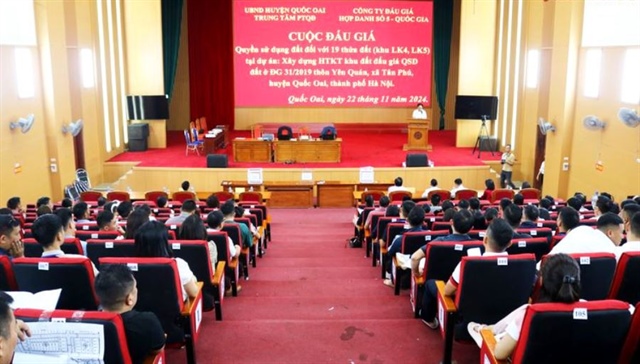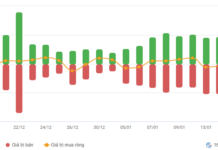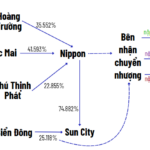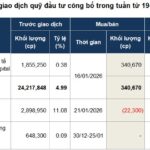Curbing Price Inflation and Deposit Forfeiture in Land Auctions
Under current regulations, when auctioning land-use rights for land allocation or lease to implement investment projects, the minimum deposit is 10% and the maximum is 20% of the starting price.
In the draft Resolution of the Government on addressing difficulties and obstacles in land-use rights auctions under the Land Law, the Ministry of Justice proposes increasing the maximum deposit from 20% to 50% of the starting price.
According to the drafting agency, there have been instances where auction participants exploit the low deposit rate to bid high and then forfeit the deposit, either for personal gain or other purposes. This practice negatively impacts the real estate market and reduces the efficiency of land resource utilization for socio-economic development. Therefore, raising the deposit rate is essential to promptly curb this issue.
Regarding violation handling, the draft Resolution stipulates that individuals who win residential land-use rights auctions but fail to fulfill their payment obligations, leading to auction result cancellation, will be banned from participating in auctions for 6 months to 5 years. Additionally, they must fully cover the organization costs, service fees, and other related expenses as required by the competent authority.
 Experts suggest that increasing the deposit amount is an effective measure to curb price inflation and deposit forfeiture in land auctions. Image: Quoc Oai District’s Information Portal |
In an interview, Lawyer Tran Tuan Anh, Director of Minh Bach Law Firm, stated that curbing price inflation and deposit forfeiture in land auctions requires a comprehensive approach involving organizers, legal regulations, participants, and market transparency.
According to Mr. Tuan Anh, increasing the deposit amount is also an effective measure. He believes that only genuine investors will be willing to pay a 50% deposit. He explains that the 50% rate is calculated based on the starting price set by the auction organizer, which is significantly lower than the winning bid price, thus not posing difficulties for individuals or businesses with real needs.
“Raising the maximum deposit to 50% is a way to demonstrate the actual financial capability of real estate auction participants,” Mr. Tuan Anh emphasized.
Regarding the proposal to ban auction participation for 6 months to 5 years and require payment of related expenses, the lawyer expressed his agreement. He believes that auction participants must be fully aware of their rights and obligations regarding the prices they bid, as well as the consequences of withdrawal.
“This solution will reduce instances of winning auctions and then forfeiting deposits, making auctions more substantive and transparent,” Mr. Tuan Anh affirmed.
Not the Optimal Solution?
While acknowledging that increasing the maximum land auction deposit to 50% could help combat price inflation and deposit forfeiture, Mr. Pham Duc Toan, CEO of EZ Real Estate Investment and Development JSC (EZ Property), expressed concern that such a high deposit rate might reduce the number of participants. This could lead to potential collusion, making the proposal less than optimal.
Mr. Toan analyzed that for individual land plots, the deposit amount is not significant. However, for projects valued at hundreds or even thousands of billions of VND, requiring a 50% deposit upfront would create difficulties, making it hard for businesses to manage their finances. Previously, with a maximum deposit of 20%, businesses could balance their funds and then use bank loans to cover the remaining 80% upon winning the auction.
“The minimum deposit should remain at 10%, while the maximum should not be fixed at a high rate, such as not exceeding 30%. Depending on the project, auction organizers should decide flexibly,” Mr. Toan suggested.
Regarding the ban on auction participation for 6 months to 5 years for violators, Mr. Toan deemed it a necessary measure in the current context. “This penalty will have a strong impact, as investors will certainly be deterred by being ‘banned’,” he said.
Nguyen Le
– 05:45 30/09/2025
“Distinguishing Between Real Estate Project Transfers and Transfers of Land Use Rights with Built Items to Organizations”
Amidst a dynamic legal and market landscape, the August 28 Real Estate Conference shed light on the nuances of two distinct real estate transaction structures. Luong Van Ly, a senior advisor at Global Vietnam Lawyers, elucidated the differences between transferring real estate projects and assigning the right to use land with existing technical infrastructure to organizations.
Two New ‘Red Book’ Regulations Bring Significant Benefits to Citizens
The new Decree No. 226, effective from August 15, 2025, brings about significant changes to land use certificate (red book) issuance regulations. The decree introduces streamlined administrative procedures and extends the period for land use fee credit. These amendments are designed to simplify the process of obtaining a land use certificate and provide greater flexibility for landowners.













































